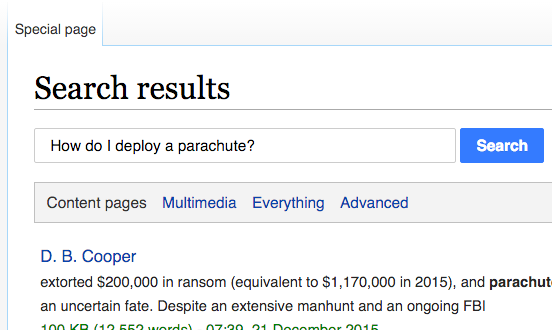
A spacecraft floats over a sea of golden clouds in this NASA image. When you search “parachute” on Wikipedia, what happens? The Discovery team works to improve that experience. Photo by NASA/Bill Ingalls, public domain.
How do people experience Wikipedia and its sister projects? At the Wikimedia Foundation, our product organization develops features that help people experience Wikipedia and the other projects. In April 2015, we organized these teams around different aspects of the user flow: Discovery, Editing, Reading, Fundraising tech, and Community Tech. These teams build and maintain technology for different audiences–readers, editors, and donors–across desktop, mobile web, and mobile apps.
We strive to be transparent about of our work and respond to the needs of our users. In this new series on the Wikimedia Blog, we’ll introduce you to the teams behind these processes and share how you can get involved. We’ll kick off the series with a post on the Discovery team.
You: How do I deploy a parachute?
Internet: Here are 418,000 pages to help you answer that.
You: *Clicks Wikipedia link.*
The path from question to answer, from curiosity to understanding, is discovery. It’s how someone finds the exact information they need, whether by asking a friend, raising a hand in a classroom, going to a library, using a search engine, or searching on a Wikimedia site like Wikipedia.
Wikipedia and its sister projects have more than 35 million articles across nearly 300 languages, nearly 30 million images, and terabytes more across the other Wikimedia sites. As the world’s free online encyclopedia, Wikipedia has made discovery of free knowledge available to people around the world.
And discovering all of this information begins with search.
The search box at the top right of every page on Wikipedia operates what’s called a “prefix search.” It compares your search query to the titles of articles on Wikipedia. Prefix search is fast and can scale to the millions of people who use Wikipedia each day, but can provide the user with no results with the wrong query. “How do I deploy a parachute” turns on no light bulbs, but “parachute” sends you right to the article.

To address that, the Wikimedia Foundation’s Discovery team has replaced prefix search with a “completion suggester,” as you may have seen on search engines. This could reduce the zero results rate by around 10%, and work faster. To test search results relevance—whether the suggester is guessing right that you want a parachute and not a parashoot—we’ve turned it into a beta feature that is now live on nearly all Wikimedia projects.
This is one of the many Discovery projects we’ve undertaken since our team formed in April 2015. We’re also working on improving search for our multilingual users. Data shows that users often enter queries in the wrong language—paracadute instead of parachute. When we included a search function that tried detecting the language of the user’s query, users were up to six times more likely to get results.
Not all discovery is text-based. In September, the Discovery team released the Wikimedia Maps Service, using OpenStreetMap data to connect Wikimedia content to corresponding locations around the world. The Wikipedia Android app now features an interactive map based on this service with little pins for Wikipedia articles about nearby points of interest.
Data can also play an important role in discovery, which is why we created the Wikidata Query Service earlier this year. This service, which is still in beta, allows you to query against the dataset of Wikidata, a free collection of structured data from the Wikimedia sister projects. Being able to search and integrate this dataset could mean improved search experiences across the Wikimedia projects.
Relatedly, we’re exploring how to improve the user interface of the search page for Wikipedia. It’s mostly just text right now, and we’re hoping that we can improve it by adding imagery and short descriptions based on Wikidata.
Our work is focused on a number of priority areas:
- Zero results rate for search. If users receive no results, it means we’ve not been able to help find what they’re looking for, so we measure the zero results rate.
- User engagement with search results. If users do not click on results, then we haven’t given them the results they wanted.
- Search latency. The faster our search works, the better.
- API use. It’s important that apps and third parties can search our site too.
These priorities help us get a rounded perspective of how search is being used, and let us know how well the efforts we’re undertaking help move the needle. They also keep us focused on user needs.
Get involved
To get involved with the Discovery team’s work, you can:
- Subscribe to the Discovery team’s public mailing list
- Read about projects and upcoming plans at the MediaWiki Discovery page
- Reach out to the Discovery team on their IRC channel: #wikimedia-discovery on Freenode.
We would love to hear your thoughts about our projects and goals!
Working with the Wikimedia community is a core priority for the entire product organization. Some specific ways we’re increasing open communication with this community include: Product Showcases, a Community Wishlist Survey and participation at the 2016 Wikimedia Developer Summit. Our Community Liaisons and Developer Relations teams are excellent partners in bringing user feedback to the forefront of product development. We also participate in conferences, hackathons and of course at Wikimania!
You can learn more about the entire Product organization on our public product page.
Tomasz Finc, Director of Discovery
Wes Moran, Vice President of Product
Wikimedia Foundation

Can you help us translate this article?
In order for this article to reach as many people as possible we would like your help. Can you translate this article to get the message out?
Start translation

